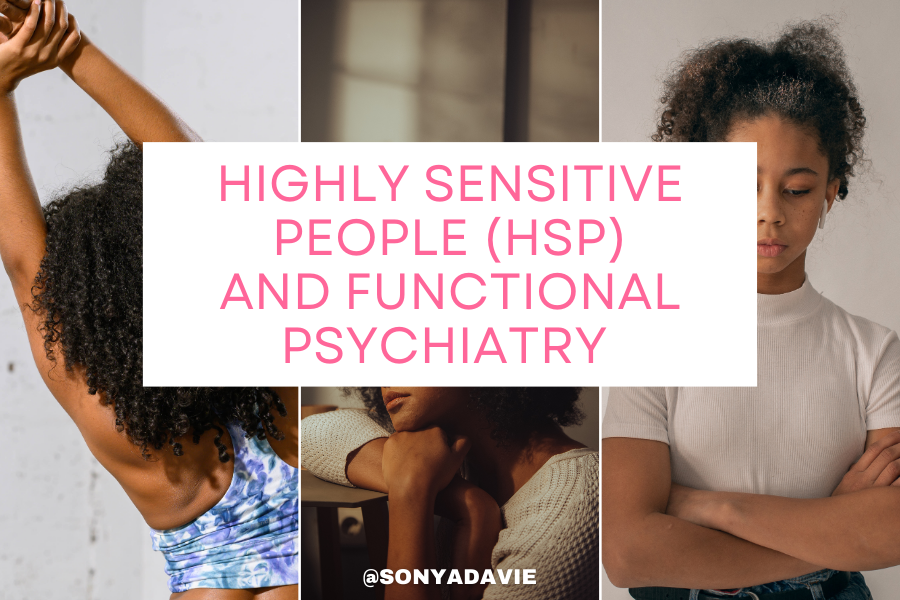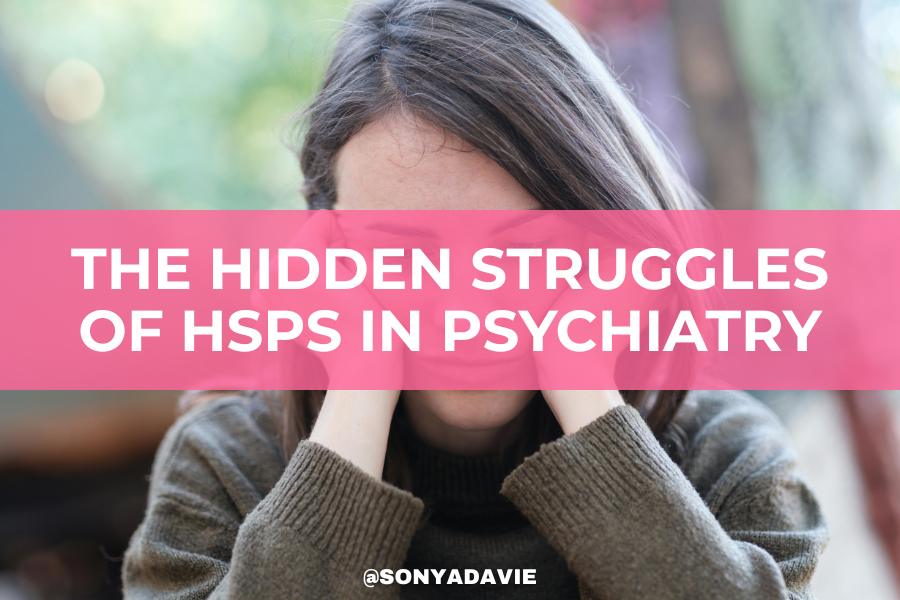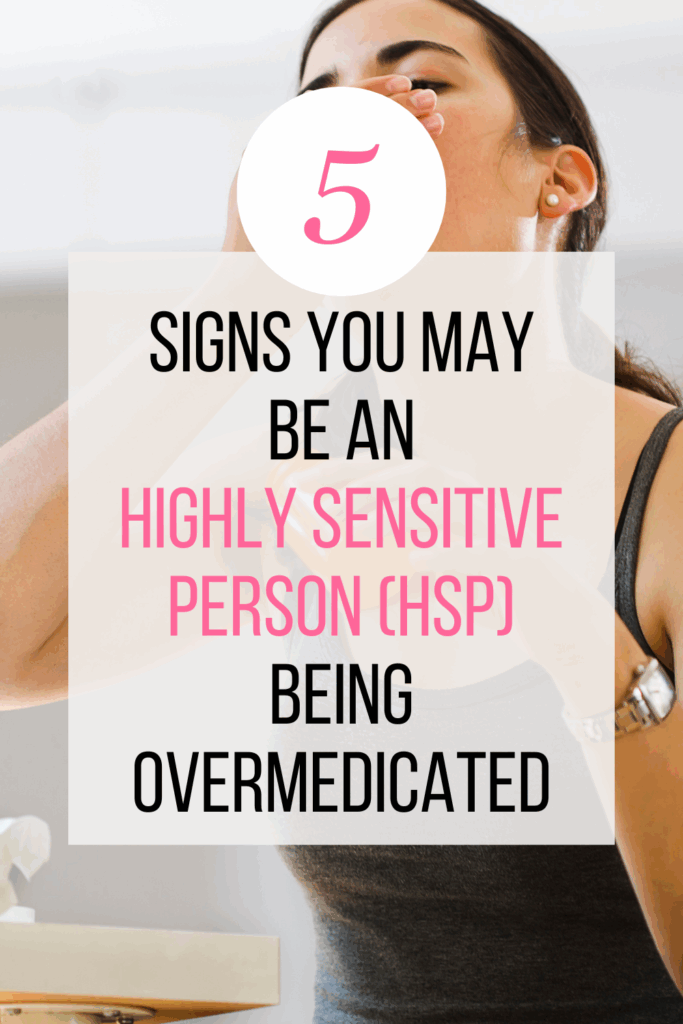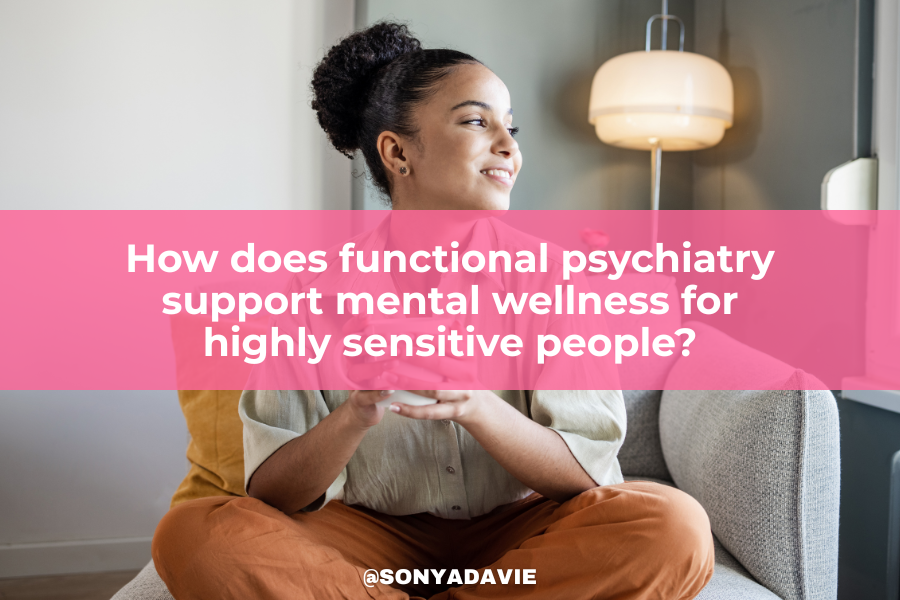If you’re a Highly Sensitive Person (HSP), life often feels more intense. Sounds seem louder, emotions run deeper, and stress sticks around longer than you’d like.
While sensitivity is a biological trait, traditional psychiatry often overlooks it! HSPs are misdiagnosed or given medication plans that don’t match their unique nervous systems.

As Dr. Elaine Aron, research psychologist and author of The Highly Sensitive Person, explains:
“The difference between HSPs and others is not that they feel more but that they notice more.”
Yet, when your nervous system becomes overstimulated, you may quickly be labeled as “anxious” or “depressed,” without anyone asking why.
This is where functional psychiatry for HSPs, a holistic, root-cause-focused approach, offers a more compassionate and effective path to mental wellness for highly sensitive people.
The Hidden Struggles of HSPs in Psychiatry
For many highly sensitive people, the standard psychiatric model feels like a quick-fix system: fast diagnoses, fast prescriptions, and little exploration of what’s really happening beneath the surface.
While medication can be lifesaving for some, it often misses the nuances of a sensitive nervous system.

- Overactive Nervous System: Research on Sensory Processing Sensitivity (SPS), the scientific name for the HSP trait, shows increased activity in brain regions tied to awareness, empathy, and emotional processing (Acevedo et al., 2014).
- Misdiagnosis & Overmedication: Because HSP responses are stronger, they may be prematurely diagnosed with anxiety, depression, or even ADHD. Prescribers often reach for medication first, sometimes leading to overmedication or stronger side effects than expected.
- Systemic Issue: As integrative psychiatrist Dr. James Greenblatt points out:
“Psychiatry has become too focused on suppressing symptoms with prescriptions rather than investigating the biological, nutritional, and psychological drivers of mental health.”
For HSPs, this mismatch between trait and treatment can actually worsen distress instead of relieving it, leaving many feeling misunderstood and discouraged.
5 Signs You May Be an HSP Being Overmedicated
Ever wonder if your medication is helping or making your sensitivity harder to manage? Here are some red flags to look out for:

- Side effects feel stronger than relief. Even small doses cause emotional blunting, fatigue, or agitation.
- Your provider keeps adding prescriptions. Instead of exploring root causes, “stacking” medications becomes the default.
- No one has tested your biology. Labs for thyroid, vitamin D, gut health, or nutrient deficiencies aren’t being considered.
- You’re told “this is just how it is.” Your intuition that something deeper is going on is dismissed.
- You feel like you’re losing your spark. Medication dulls your empathy, creativity, or energy rather than supporting them.
👉 If these resonate, a functional psychiatry evaluation for HSPs could help uncover overlooked causes and guide a gentler, more personalized treatment plan.
How Functional Psychiatry Helps
Unlike conventional psychiatry, holistic psychiatry for empaths and HSPs doesn’t start with “What diagnosis fits these symptoms?” Instead, it asks:
- What biological factors are amplifying your sensitivity?
- How do lifestyle, nutrition, and trauma affect your nervous system?
- Could gentler, root-cause solutions reduce distress without suppressing your natural gifts?

Here are some ways functional psychiatry supports mental wellness for highly sensitive people:
- Root-Cause Testing: Functional psychiatrists may order advanced labs for thyroid health, micronutrients (vitamin D, magnesium, B12), gut health, and inflammation, factors that often contribute to anxiety and depression.
- Medication with Caution: Because HSPs often respond strongly to medications, functional psychiatrists usually start with lower doses or slower titration. As Dr. Aron highlights, “sensitive people frequently respond strongly to medication, sometimes too strongly.”
- Mind-Body Reset: Gentle practices like somatic therapy, yoga, breathwork, or EMDR help calm an overactive nervous system without heavy reliance on prescriptions.
- Nutrition & Gut Health: The gut-brain axis plays a huge role in mood regulation. Research shows imbalances in the gut can fuel anxiety and depression.
- Lifestyle Alignment: Restful sleep, strong boundaries, and sensory breaks aren’t optional, they’re essential for HSP resilience.
The Cost of Ignoring Nervous System Sensitivity
When psychiatry overlooks sensitivity, HSPs often:
- Cycle through multiple medications without a lasting benefit
- Experience amplified side effects like fatigue, agitation, or emotional blunting
- Lose trust in the mental health system
- Miss opportunities for non-pharmaceutical healing
The heartbreaking part?
Many HSPs leave treatment believing they’re “broken,” when in reality, their biology just requires a different approach.

For highly sensitive people and empaths, thriving doesn’t come from numbing sensitivity, it comes from honoring it.
Functional psychiatry for HSPs offers a roadmap that is both compassionate and science-based.
It validates that sensitivity is real… not a flaw.
It recognizes that HSPs process medication differently.
It prioritizes root causes and lifestyle changes before prescriptions.
As Dr. Leslie Korn, expert in integrative mental health, reminds us:
“Healing the brain requires nourishing the body, respecting individuality, and addressing trauma—not just prescribing a pill.” (Nutrition Essentials for Mental Health, 2016)
Final Thoughts…
If you’re an HSP struggling with overwhelm, anxiety, or burnout, remember this: your sensitivity is not something to be muted or medicated away.
With holistic psychiatry for empaths and a functional approach to care, your mental wellness can be supported in ways that embrace your biology, lifestyle, and individuality.
When treated with compassion and root-cause solutions, your sensitivity doesn’t have to feel like a burden, it can become your greatest strength.

+ show Comments
- Hide Comments
add a comment